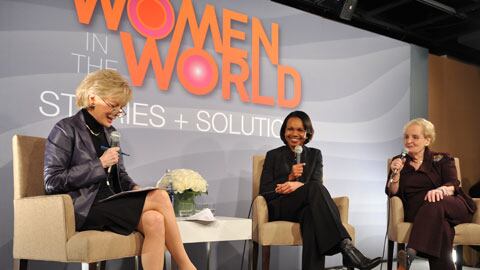At Newsweek and The Daily Beast's Women in the World summit, former Secretaries of State Madeleine Albright and Condoleezza Rice set aside their differences for a rare and candid talk on women's rights, how Gaddafi's "a nut," and their successor, Hillary Clinton. R.M. Schneiderman and Shushannah Walshe report. Plus, complete coverage of Women in the World and video of the summit's most riveting moments so far.
Rice and Albright were critical of Libyan strongman Muammar Gaddafi, a leader whom Albright simply described as "a nut." Yet unlike President Clinton, who broke from the Obama administration policy and boldly advocated for a no-fly zone in Libya when he spoke at the summit Thursday evening, both Albright and Rice were more cautious. Neither diplomat would explicitly advocate a no-fly zone or a particular policy that the White House should put in place in light of the fighting going on in the country. "No-fly zones are no small matter," said Rice. "We flew a no-fly zone over Iraq for 12 years and almost every time we flew over, [the Iraqis] shot at our aircrafts. If we go in that direction, let's think about what we're really taking on."
Gallery: Women in the World Summit

Both Rice and Albright said the challenges women face remain especially daunting in the Middle East, and that there has not been a straight line of progress toward equality. Calling the frequency of sexual assault and harassment in places like Egypt "horrifying," Albright said that women around the world needed to continue to speak out against such violence and oppression.
Attempting to be diplomatic, both Rice and Albright criticized a certain Arab state without mentioning its name, before a question from the audience prompted them to admit the obvious: that they had been referring to Saudi Arabia. "Saudi Arabia is behind… the curve," said Rice. "I believe women have to have political rights." At the same time, Rice spoke positively about King Abdullah's decision to open a technical—as opposed to religious—university in the country, calling it an "important decision… toward education and women's political rights."
“If you’ve been at that desk on 7th floor when something goes wrong,” said Rice, “you tend to have a little bit more humility about what it takes to do that job.”
That Rice and Albright shared such similar views is perhaps a product of their unique history as two of only three women in the U.S. to ever hold the title of secretary of state. "If you've been at that desk on 7th floor when something goes wrong," said Rice, "you tend to have a little bit more humility about what it takes to do that job."
Yet the two women were a study in contrasts as they spoke over lunch. Rice, tall and striking, was dressed in all black—from her suit to her high heels. Albright wore a lavender scarf and an assortment of dangly gold bracelets along with her purple pantsuit.
Even beyond their appearances, the two diplomats seem to have little in common. Albright was born in Eastern Europe and came to the U.S. as a teenager; Rice was raised in the Deep South. Albright served under President Bill Clinton, long the bête noire of conservative Republicans; Rice was part of the second Bush administration, among the most conservative in recent memory.
Rice and Albright discuss the fight for women's rights in the Middle East.
But the two women share a remarkable personal connection. Albright's father, Josef Korbel, served as mentor to Rice, whom he taught at the University of Denver's Graduate School of International Studies.
The audience was packed with activists from around the world, including Egyptian firebrand Dr. Nawal El Saadawi. The three-day summit is co-hosted by Diane von Furstenberg, Meryl Streep, Facebook's Chief Operating Offficer Sheryl Sandberg, President of the Rockefeller Foundation Judith Rodin, and Dr. Ngozi Okonjo-Iweala, managing director of the World Bank.
Both women paid tribute to Hillary Clinton's pioneering work on women's rights. As Gayle Tzemach Lemmon reports in the most recent edition of Newsweek, it was Clinton who put women's rights at the forefront of American diplomacy during a speech in Beijing in 1995. "Hillary… said women's rights are human rights," said Albright. "We need to keep speaking out."
Different as they may seem on the surface, both Rice and Albright are doing just that.
R.M. Schneiderman is a reporter for Newsweek.
Shushannah Walshe covers politics for The Daily Beast. She is the co-author of Sarah From Alaska: The Sudden Rise and Brutal Education of a New Conservative Superstar. She was a reporter and producer at the Fox News Channel from August 2001 until the end of the 2008 presidential campaign.






